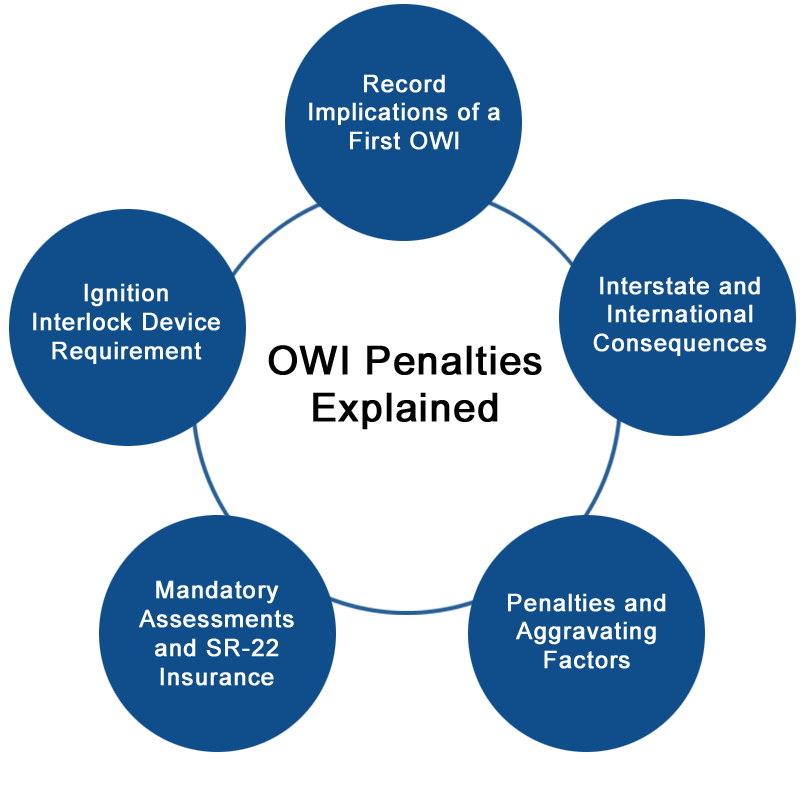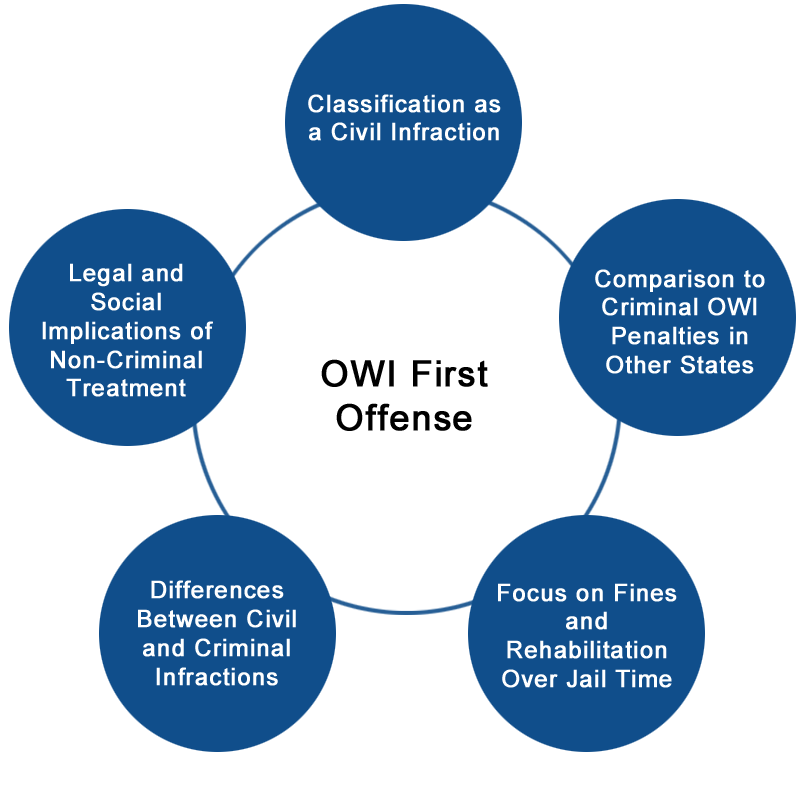
OWI First Offense Wisconsin
In Wisconsin, a first OWI (Operating While Intoxicated) offense is classified as a civil infraction, similar to a traffic violation, and is not treated as a criminal offense. Civil infractions are generally considered minor, non-criminal offenses, while criminal infractions involve more serious violations with stricter consequences. In most states, impaired driving charges are treated as criminal offenses. Wisconsin stands out as the only state in the U.S. that treats a first OWI (Operating While Intoxicated) offense as a civil violation, focusing on fines and rehabilitation rather than criminal penalties.
An OWI Stays on Your Permanent Record
Even though it’s considered a civil violation or non-criminal offense, a first OWI will appear on your permanent public record unless it is acquitted or dismissed. “Acquitted” means that a person has been formally found not guilty of the charges by a judge or jury, while “dismissed” refers to charges being dropped by the court, typically before a trial, due to insufficient evidence or other legal reasons. Another option could be to reduce the charge to a lesser offense, such as reckless driving or a non-DUI disposition.
How OWI is Treated Outside Wisconsin
An OWI conviction in Wisconsin can have serious consequences beyond state borders, such as restrictions on entry to countries like Canada, which frequently denies entry to those with impaired driving records. What might seem like a minor offense locally can impact your ability to travel, secure employment, and advance in your career. Additionally, other states handle impaired driving offenses more strictly than Wisconsin, imposing harsher penalties with less tolerance. This means that employers in states with tough impaired driving laws often view these charges unfavorably.
Additionally, being convicted, even for a first offense, can be used against you in future cases, potentially leading to more severe penalties if you’re charged with another OWI offense. Due to the potential long-term impact, particularly on career opportunities, many people choose to fight and challenge their OWI charges to avoid a permanent record that could have adverse repercussions on their future careers and credit.
Although many people may feel intimidated by the idea of challenging an OWI charge and facing the prosecution, police, and court system, it is quite common for individuals in Wisconsin to contest OWI charges successfully and prevent the charge from affecting them for the rest of their lives.
Penalties for a First OWI Offense
Below is an overview of the potential penalties associated with a first offense OWI in Wisconsin. Penalties can vary widely depending on the specifics of the case and any prior history. Additionally, the presence of aggravating factors can result in more severe consequences, even for a first-time offender. Examples of aggravating factors include a BAC of 0.15% or higher, having a minor under 16 in the vehicle, causing an accident, injury, or death, excessive speeding, driving without a valid license or insurance, attempting to evade law enforcement, and more.
Each OWI charge in Wisconsin may include jail time, fines, court costs and fees, license suspension, an Ignition Interlock Device, probation, community service, participation in a Victim Impact Panel, and more.
Additionally, in Wisconsin, a Mandatory Alcohol and Other Drug Assessment (AODA) is usually required for all first offense OWI convictions. This assessment evaluates the individual’s alcohol or drug use to determine whether further education or treatment is necessary. Depending on the outcome, offenders may be mandated to complete additional counseling or treatment as part of their sentence.
One often-overlooked consequence of an OWI arrest is the need for SR-22 insurance to obtain an Occupational Driver’s License. This license permits limited driving, such as commuting to work, while your case is pending. SR-22 insurance, classified as high-risk, typically comes with higher premiums than standard policies.
It’s important to remember that the penalties listed below only apply if you are convicted of the OWI charge, meaning the court has formally found you guilty. Fortunately, hiring an experienced attorney significantly increases your chances of having the OWI charge dismissed, acquitted, or reduced.
First OWI Offense (General Penalties with No Aggravating Factor)
- • Classification: Non-criminal traffic violation
- • Fines: $150 to $300 or more
- • License Suspension: 6 to 9 months
- • Ignition Interlock Device (IID): Not required unless BAC is over 0.15%
- • Jail Time: No jail time for civil infractions (in most cases)
- • Probation and Conditions of Release: May be ordered depending on the circumstances
- • Mandatory Alcohol and Other Drug Assessment (AODA): $275 to $300 or more
- • Community Service: Not typically required, but can be.
- • Victim Impact Panel: A possible repercussion, varies by county and case specifics
- • Occupational Driver’s License: $50 application fee (Eligible to apply after 30 days of suspension)
- • SR-22 insurance is typically required to obtain an Occupational Driver’s License after an OWI arrest
- • IID Installation & Service Charges: (If Over 0.15%)
- – Installation fee: $100 to $150 or more
- – Monthly service fees: $60 to $80 per month or more
- • Reinstatement Fee: $200 or more to reinstate a suspended license
- • Court Surcharge: Typically, around $435 (Wisconsin Driver Improvement Surcharge)
First OWI Offense with BAC Over 0.15%
- • Classification: This depends on the circumstances of the case
- • Fines: $300 to $1,200 or more
- • License Suspension: 6 to 9 months
- • Ignition Interlock Device or 24/7 Sobriety Program for one year
(The IID must be installed in their vehicle, while the 24/7 Sobriety Program involves regular alcohol testing)
- • Jail Time: This depends on the specifics of the case.
- • Probation and Conditions of Release: May be ordered depending on the circumstances
- • Mandatory Alcohol and Other Drug Assessment (AODA): $275 to $300 or more
- • Community Service: Not typically required
- • Victim Impact Panel: A possible repercussion, varies by county and case specifics
- • Occupational Driver’s License: $50 application fee (Eligible to apply after 45 days of suspension)
- • SR-22 insurance is typically required to obtain an Occupational Driver’s License after an OWI arrest
- • IID Installation & Service Charges:
- – Installation fee: $100 to $150 or more
- – Monthly service fees: $60 to $80 per month or more
- • Reinstatement Fee: $200 or more
- • Court Surcharge: $435
- • IID Surcharge: Wisconsin may apply an IID compliance fee, typically $50 to $100 or more
First OWI Offense Involving an Accident (No Injury or Death)
- • Classification: It depends (on the severity of the accident and other factors)
- • Fines: $150 to $300 or more (increased penalties possible based on accident severity)
- • License Suspension: 6 to 9 months
- • Ignition Interlock Device (IID): Required if BAC is 0.15% or higher
- • Jail Time: It depends on the facts of the case
- • Probation and Conditions of Release: May be ordered depending on the circumstances
- • Mandatory Alcohol and Other Drug Assessment (AODA): $275 to $300 or more
- • Community Service: Not typically required but could be ordered
- • Victim Impact Panel: A possible repercussion, varies by county and case
- • Occupational Driver’s License: $50 application fee (Eligible to apply after 30 days of suspension)
- • SR-22 insurance is typically required to obtain an Occupational Driver’s License after an OWI arrest
- • IID Installation & Service Charges:
- – Installation fee: $100 to $150 or more
- – Monthly service fees: $60 to $80 per month or more
- • Reinstatement Fee: $200 or more
- • Court Surcharge: $435
First OWI Offense Involving Injury
- • Classification: Usually a misdemeanor, but this depends on the circumstances of the case.
- • Fines: $300 to $2,000 or more
- • License Suspension: 1 to 2 years or more
- • Ignition Interlock Device (IID): Required for 1 to 2 years or more
- • Jail Time: Up to 1 year or more (depending on the severity of the injury)
- • Probation and Conditions of Release: May be ordered depending on the circumstances
- • Mandatory Alcohol and Other Drug Assessment (AODA): $275 to $300 or more
- • Community Service: Likely required
- • Victim Impact Panel: A possible repercussion, varies by county and case
- • Occupational Driver’s License: $50 fee (Eligible to apply after 45 days of suspension)
- • SR-22 insurance is typically required to obtain an Occupational Driver’s License after an OWI arrest
- • IID Installation & Service Charges:
- – Installation fee: $100 to $150 or more
- – Monthly service fees: $60 to $80 per month or more
- • Reinstatement Fee: $200 or more
- • Court Surcharge: $435
- • IID Surcharge: Typically $50 to $100 or more
First OWI Offense Involving Great Bodily Harm
- • Classification: Felony
- • Fines: $5,000 to $50,000 or more
- • License Suspension: 2 to 5 years or more
- • Ignition Interlock Device (IID): Required for 1 to 3 years or more
- • Jail Time: Up to 12.5 years in prison or more
- • Probation and Conditions of Release: May be ordered depending on the circumstances
- • Mandatory Alcohol and Other Drug Assessment (AODA): $275 to $300 or more
- • Community Service: May be part of the sentencing
- • Victim Impact Panel: A possible repercussion, depending on case specifics
- • Occupational Driver’s License: $50 fee (Application eligibility varies by case, typically after 6 months or longer)
- • SR-22 Insurance: Typically required to obtain an Occupational Driver’s License after an OWI arrest
- • IID Installation & Service Charges:
- – Installation fee: $100 to $150 or more
- – Monthly service fees: $60 to $80 per month or more
- • Reinstatement Fee: $200 or more
- • Court Surcharge: $435
- • IID Surcharge: $50 to $100 or more
First OWI Offense Involving Death
- • Classification: Felony
- • Fines: $2,500 to $100,000 or more
- • License Suspension: 5 to 10 years or more
- • Ignition Interlock Device (IID): Required for 1 to 3 years or more
- • Jail Time: Up to 25 years in prison or more
- • Probation and Conditions of Release: May be ordered depending on the circumstances
- • Mandatory Alcohol and Other Drug Assessment (AODA): $275 to $300 or more
- • Community Service: May be part of the sentencing
- • Victim Impact Panel: A possible repercussion, depending on case specifics
- • Occupational Driver’s License: $50 fee (Application eligibility varies by case, typically after 6 months or longer)
- • SR-22 insurance is typically required to obtain an Occupational Driver’s License after an OWI arrest
- • IID Installation & Service Charges:
- – Installation fee: $100 to $150 or more
- – Monthly service fees: $60 to $80 per month or more
- • Reinstatement Fee: $200 or more
- • Court Surcharge: $435
- • IID Surcharge: $50 to $100 or more
First OWI Offense with a Child in the Car (Under 16)
- • Classification: Misdemeanor or Felony (it depends on the circumstances of the case)
- • Fines: $350 to $1,100 or more
- • License Suspension: 1 to 2 years or more
- • Ignition Interlock Device (IID): Required for 1 year or more
- • Jail Time: 5 days to 6 months or more
- • Probation and Conditions of Release: May be ordered depending on the circumstances
- • Mandatory Alcohol and Other Drug Assessment (AODA): $275 to $300 or more
- • Community Service: May be required at the judge’s discretion
- • Victim Impact Panel: A possible repercussion, depending on case specifics
- • Occupational Driver’s License: $50 fee (Eligible to apply after 60 days of suspension)
- • SR-22 insurance is typically required to obtain an Occupational Driver’s License after an OWI arrest.
- • IID Installation & Service Charges:
- – Installation fee: $100 to $150 or more
- – Monthly service fees: $60 to $80 per month or more
- • Reinstatement Fee: $200 or more
- • Court Surcharge: $435
- • IID Surcharge: $50 to $100 or more
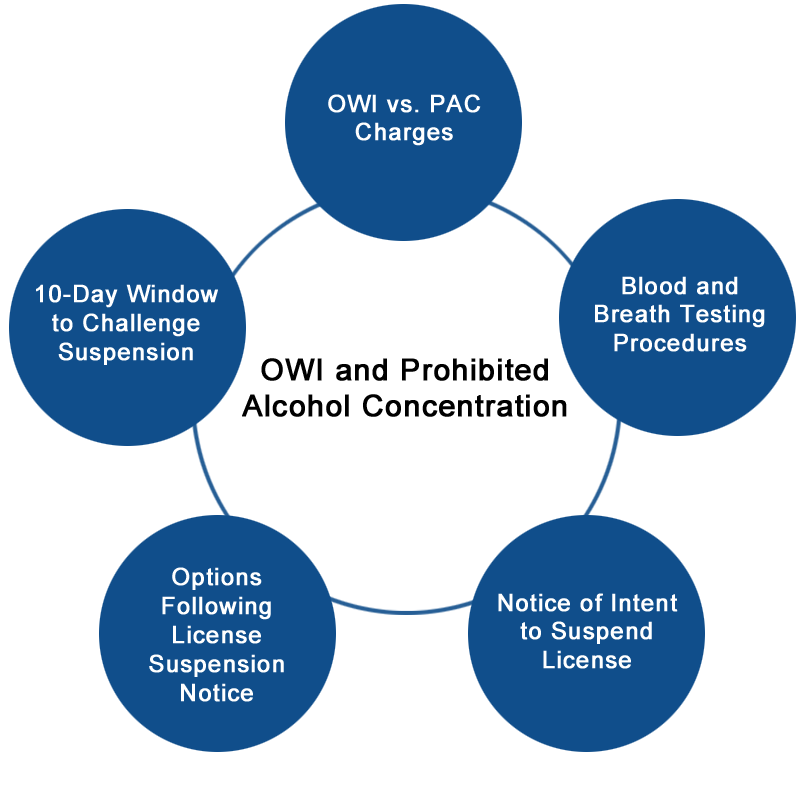 OWI and Prohibited Alcohol Concentration in Wisconsin Explained
OWI and Prohibited Alcohol Concentration in Wisconsin Explained
In Wisconsin, if you’re accused of impaired driving, you may face two charges. The first is for operating while impaired (OWI), meaning the police believe you were unable to safely drive due to alcohol or drugs. The second charge is for having an illegal amount of alcohol or drugs in your system (Prohibited Alcohol Concentration), determined through a blood or breath test. You can receive both charges because the State can choose to pursue either one in court based on the circumstances. The first focuses on your level of impairment, while the second looks at your blood alcohol or drug concentration.
For example, let’s say you’re at a party, have a few drinks, and decide to drive home. If you’re pulled over because the officer thinks you’re driving erratically, and they believe you’re too impaired to safely drive, they might charge you with OWI (Operating While Impaired). Later, if your blood alcohol concentration (BAC) comes back over the legal limit of .08%, you could also be charged with PAC (Prohibited Alcohol Concentration).
In another example, imagine someone being accused of driving while impaired by a drug like marijuana. If an officer pulls them over due to their driving and they appear impaired, the officer could charge them with OWI. Even if they don’t seem very impaired, a blood test that detects marijuana or another restricted substance in their system could also lead to a PAC charge.
What is a Notice of Intent to Suspend Your License?
If you’re pulled over and fail a breath or blood test, you’ll be issued a Notice of Intent to Suspend Your License. This document is an official notification that your driving privileges will be suspended in 30 days, with the suspension lasting up to six months or longer. During the 30 days following the notice, the form will act as a temporary permit, allowing you to drive legally until the suspension takes effect. Once you receive this notice, you have two main options: you can apply for an occupational license to continue driving for essential activities, such as work or school, or you can challenge the suspension. If you choose to challenge it, it’s crucial to act quickly and seek the assistance of an attorney to guide you through the process and improve your chances of keeping your license. Please note that you only have 10 days from your arrest to challenge the license suspension. More information is listed below about the administrative hearing process for a first offense OWI.
Refusing the Breath Test for a First Offense OWI
Refusing a breath test in Wisconsin for the first OWI results in a one-year license revocation and a required Ignition Interlock Device (IID) for one year. You also cannot get an occupational license for the first 30 days of your revocation. It is important to note that because there are no breath test results, the prosecution will have less direct evidence to prove your impairment.
Breath Test Refusal and the 10-Day Rule
Under Wisconsin’s implied consent law, drivers implicitly agree to submit to a breath test when they apply for their driver’s license if they are suspected of driving impaired. Refusing the test results in an automatic license suspension and other sanctions. You have 10 days from the date of your citation to request a refusal hearing if you declined to take a breath test after an arrest. This hearing allows you to challenge the automatic one-year license suspension.
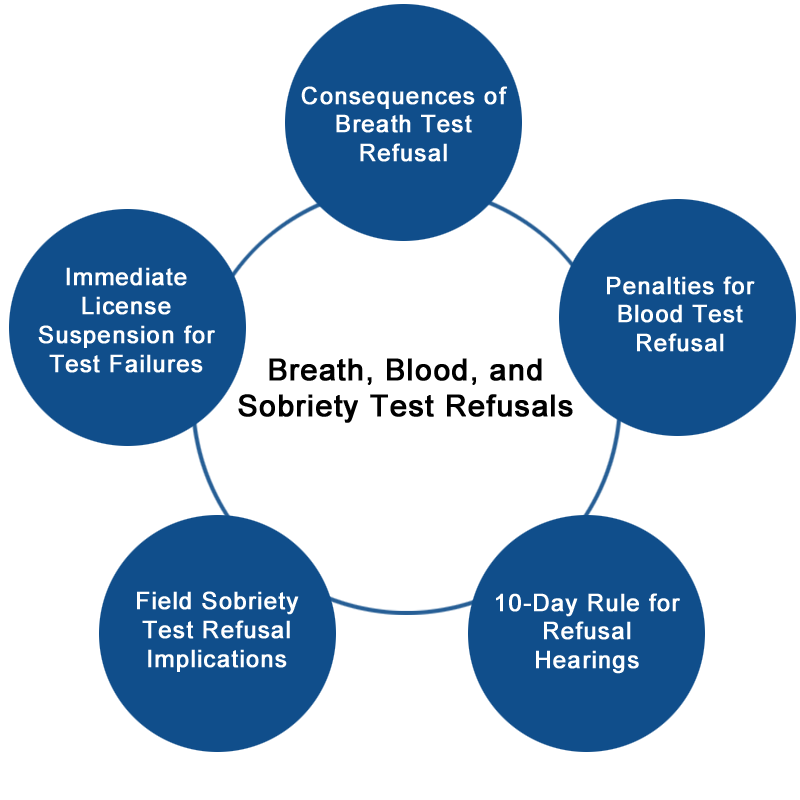 Refusing the Blood Test for a First Offense OWI
Refusing the Blood Test for a First Offense OWI
Refusing a blood test for a first OWI (Operating While Intoxicated) in Wisconsin can result in penalties, including a potential one-year license revocation, a required Ignition Interlock Device (IID) for one year, and a 30-day waiting period before you’re eligible for an occupational license. While refusal limits the prosecution’s ability to present direct evidence of your blood alcohol level, it does not prevent them from pursuing charges based on other signs of impairment, such as physical appearance (e.g., bloodshot eyes), behavioral cues (e.g., slurred speech), odor of substances, and issues with balance and coordination.
Additionally, police can potentially still obtain a search warrant for a blood test, depending on the circumstances of the case, as outlined in Wisconsin Statute 968.13(1)(b). If you comply with the blood test, penalties may include fines, a 6-9 month license revocation, an Alcohol and Other Drug Abuse (AODA) assessment with treatment, and possibly an IID if your blood alcohol concentration (BAC) is elevated. While these consequences are severe, it is important to understand that if you refuse, it might be more difficult for the prosecution to prove that you were operating while impaired.
Blood Test Refusal and the 10-Day Rule
Under Wisconsin’s implied consent law, drivers also agree to submit to blood tests if suspected of OWI when applying for a driver’s license. If you refuse the test after an arrest, you have 10 days from the citation date to request a refusal hearing and challenge the suspension of your license. Failing to do so can result in a one-year suspension and other serious sanctions.
Refusing Field Sobriety Test for a First Offense OWI
Refusing field sobriety tests in Wisconsin for a first OWI does not result in additional penalties, but your refusal can be used as evidence to try and show impairment in court. There is no legal requirement to take these tests, though refusal may lead to an immediate arrest based on the officer’s observations. Conversely, because there are no field sobriety test results, the prosecution will have less direct evidence to prove your impairment.
Failing the Breath Tests and License Suspension
Your driver’s license can be immediately suspended after a first offense OWI arrest if you fail or refuse a chemical test, with the suspension beginning after 30 days. In Wisconsin, a first OWI offense typically leads to a license suspension of 6 to 9 months for failing. When issued a temporary license after an OWI arrest, the officer will give you a white document titled “Notice of Intent to Revoke” or “Notice of Intent to Suspend.” This notice states that your license will be suspended in 30 days unless you request an administrative hearing within 10 days, excluding the issuance day, weekends, and holidays.
The Administrative Hearing Explained
The administrative hearing focuses solely on your driver’s license suspension, not the criminal aspects of your OWI/APC case. However, it’s crucial to pursue the hearing if you’re challenging the charges, as it can benefit your overall defense by helping you regain your driver’s license and by aggressively pursuing dismissal, acquittal, or reduction of your OWI/APC charges. In Wisconsin, the Department of Transportation (DOT) manages license suspensions after an OWI arrest. You must request an administrative hearing within 10 days of receiving the Notice of Suspension to contest it. Success could lift the suspension, and cross-examining the officer during the hearing may reveal valuable evidence for your criminal case. Even if unsuccessful, you can appeal the decision, so we encourage everyone accused of OWI to pursue this appeal process.
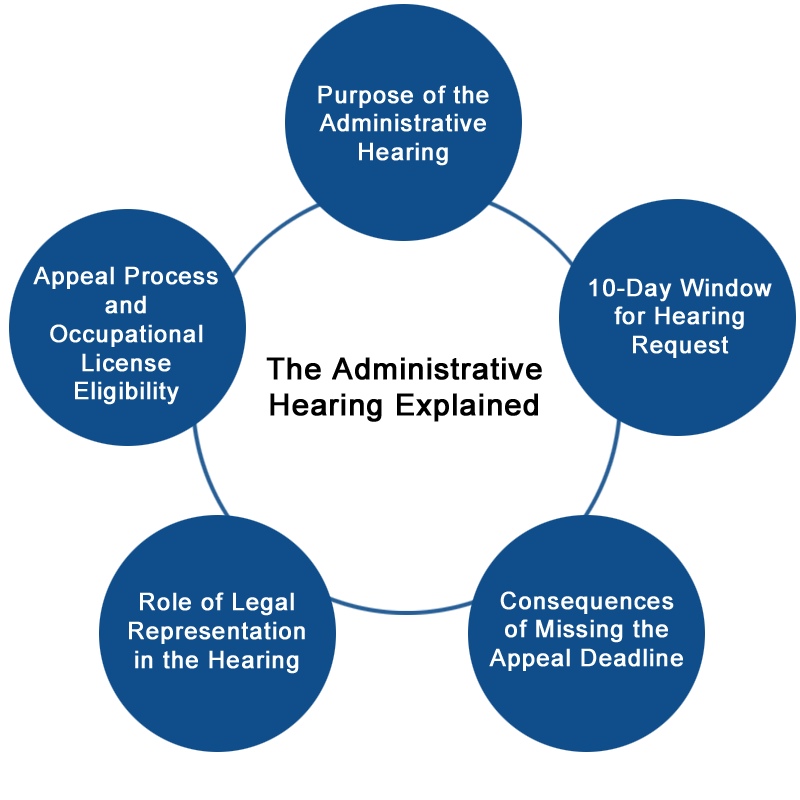 What Happens if You Don’t Appeal Your Driver’s License Suspension Within 10 Days
What Happens if You Don’t Appeal Your Driver’s License Suspension Within 10 Days
If you don’t request a hearing within 10 days, you’ll face penalties for refusing the chemical test, which include a conviction treated like an impaired driving offense. You’ll also lose driving privileges, need to install an ignition interlock device, and complete an alcohol and drug assessment with required follow-up treatment.
Attending the Administrative Hearing
If you decide to work with Tracey Wood & Associates, your attorney will file the driver’s license appeal, attend the administrative hearing on your behalf, and meet with a representative from the Department of Transportation to argue for your license to be reinstated. Hearing results usually take one business day. If successful, you keep your driving privileges; if not, your privileges end 30 days after the Notice of Intent to Suspend. Your attorney can appeal or help with an occupational license. Multiple suspensions in 12 months may affect your eligibility for an occupational license.
Occupational Licenses and Hardship Licenses
If this is your first OWI, you can apply for an occupational/hardship license immediately. This allows you to travel to and from work. If you have prior OWI charges, there is a 45-day waiting period before you are eligible to apply for an occupational license.
You will be required to show proof of insurance in order to receive an occupational license. To do so, you must request an SR-22 form from your insurance provider. This means your insurance provider will probably raise your insurance rates and could change your coverage.
With an occupational license, you can drive to and from work or for “homemaking” purposes. There are some limits on the amount of time you can drive – no more than 12 hours per day and 60 hours per week.
Occupational License Waiting Periods
In Wisconsin, the waiting periods for obtaining an Occupational License after a first offense OWI (Operating While Intoxicated) conviction vary depending on the specifics of the case. Here’s a breakdown:
Standard First Offense OWI (Blood Alcohol Content Below 0.15%):
Waiting Period: No waiting period. Eligible to apply for an occupational license immediately after license revocation.
First Offense OWI with High Blood Alcohol Content (BAC of 0.15% or Above):
Waiting Period: Immediate eligibility, but an Ignition Interlock Device (IID) is required for at least 1 year.
First Offense OWI Involving Injury:
Waiting Period: 60-day waiting period before eligibility.
First Offense OWI Involving Great Bodily Harm:
Waiting Period: 120-day waiting period before eligibility.
First Offense OWI Involving Death:
Waiting Period: 120-day waiting period, with eligibility potentially influenced by the case specifics and the judge’s discretion.
First Offense OWI Involving an Accident (Non-Injury):
Waiting Period: 30-60 days, depending on the circumstances and specific county regulations.
First Offense Refusal to Submit to Chemical Testing (Implied Consent Violation):
Waiting Period: 30-day waiting period from the start of the revocation period.
Prior Offenses and Lookback Period
In Wisconsin, if a previous OWI occurred more than 10 years ago, it typically won’t be counted as a prior offense for sentencing purposes. In such cases, the individual would generally be treated as a first-time offender for any new OWI conviction. However, for those with two or more OWI convictions, Wisconsin enforces a lifetime lookback, meaning all prior OWI offenses will be considered, regardless of when they happened, leading to harsher penalties as a repeat offender.
For out-of-state impaired driving charges, whether they count against you depends on the specifics of the charge and the time that has passed. Wisconsin may consider out-of-state offenses if they are similar to Wisconsin’s OWI laws, potentially impacting sentencing.
Accused of OWI While Visiting Wisconsin
If you’re convicted of an OWI (Operating While Intoxicated) in Wisconsin and your home state finds out, you could face penalties in both places. Most states share information about OWIs, so even though the offense happened in Wisconsin, your home state might still punish you with things like license suspension, fines, or required alcohol programs. This means you could deal with consequences in both states for the same offense.
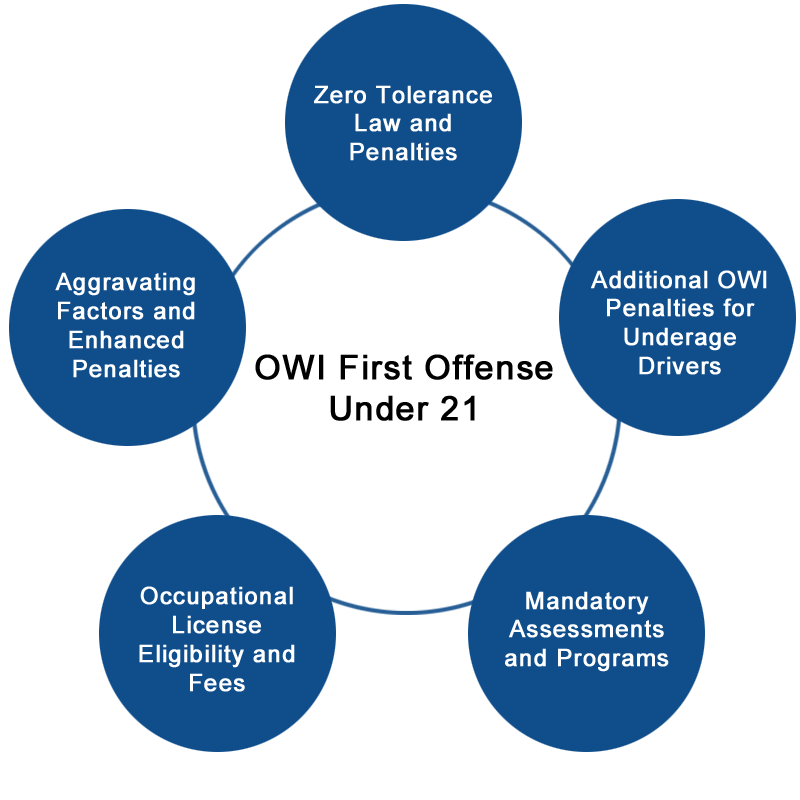 OWI First Offense Under 21
OWI First Offense Under 21
The Zero Tolerance (“Not a Drop”) penalties in Wisconsin apply to drivers under the age of 21 who are found to have any detectable amount of alcohol in their system (BAC over 0.00%) while operating a vehicle. This means that even if the driver’s BAC is below the legal limit for adults (0.08%), they can still face penalties under the “Not a Drop” law for consuming alcohol while being under the legal drinking age. These penalties include a license suspension of 3 months, fines ranging from $200 to $400, and the addition of 4 demerit points to the driver’s license.
In addition to the Zero Tolerance penalties, a first OWI offense under 21 comes with additional consequences. Fines can range from $150 to $300 or more, depending on the specifics of the case. The license suspension for the OWI charge can be between 6 to 9 months, which is applied in addition to the 3-month suspension for the Zero Tolerance violation. If the BAC is 0.15% or higher, the offender is required to install an Ignition Interlock Device (IID) for one year or participate in a 24/7 Sobriety Program, which includes regular alcohol testing.
For a first offense, jail time is not typically required unless there are aggravating factors such as causing injury, death, or having a minor in the vehicle. Probation may be imposed based on the details of the case. Offenders must also undergo a Mandatory Alcohol and Other Drug Assessment (AODA), costing between $275 and $300, to evaluate alcohol or drug use, which could lead to required counseling or treatment. The court may require attendance at a Victim Impact Panel where offenders hear stories from victims of drunk driving, though this depends on the county and the specific case. Community service is not usually required but may be ordered at the court’s discretion.
Drivers may apply for an occupational license after 30 to 45 days of suspension, with a $50 application fee. The cost of installing an IID typically ranges from $100 to $150 or more, with monthly service fees between $60 and $80 or more. To reinstate their license after the suspension period, drivers must pay a reinstatement fee of $200 or more, along with a court surcharge of approximately $435.
If the BAC is 0.15% or higher, the driver faces additional OWI penalties, including mandatory IID installation or participation in a sobriety program. If a minor under 16 years old was in the vehicle during the offense, more severe penalties may apply, such as potential jail time and increased fines.
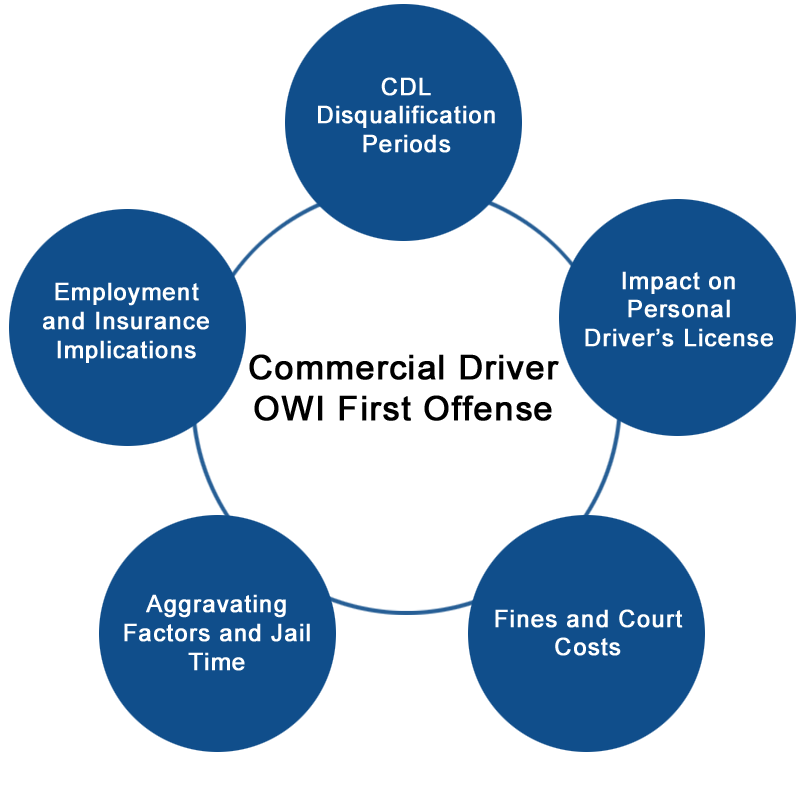 OWI First Offense as a Commercial Driver
OWI First Offense as a Commercial Driver
For a first OWI (Operating While Intoxicated) offense in Wisconsin with a Commercial Driver’s License (CDL), the penalties are more severe than for regular drivers. The primary consequence is a one-year disqualification of your CDL, even if the offense occurs in your personal vehicle. If hazardous materials are involved, this disqualification can extend to three years. You may also face fines ranging from $150 to $300, along with additional surcharges and court costs. While jail time is generally not required for a first offense, aggravating factors such as having a minor in the vehicle could lead to a sentence of 5 days to 6 months in jail.
Your personal driver’s license will be suspended for 6 to 9 months, though you may be eligible for an occupational license after 30 days. If your BAC is 0.15% or higher, you will be required to install an Ignition Interlock Device (IID) on your personal vehicle for 12 months. Additionally, you must complete an Alcohol and Other Drug Assessment (AODA) and follow any recommended treatment or counseling. While community service and probation are not typical for a first offense, they may be imposed depending on the circumstances. Finally, expect a significant increase in insurance premiums and possibly the need to file an SR-22 form with your insurance company.
For commercial drivers, the disqualification of your CDL will likely lead to serious work problems, especially if driving is your livelihood. Unless you challenge and beat the charges, restoring your reputation and clearing your name as a commercial driver may be difficult.
Why First Offense OWI Charges Can Be Negotiated
First-offense OWI charges can potentially be dismissed, acquitted, or reduced because it’s your first time, so courts may be more open to leniency. The penalties for a first OWI are usually lighter, and often treated like a traffic violation instead of a criminal charge. Judges and prosecutors may be more open to negotiations or other alternatives for first-time offenders, especially if there are no serious issues involved. In many cases, the charges are amended to reckless driving.
Potential Ways to Challenge Your First Offense OWI
There are hundreds of ways to have your first offense OWI reduced, dismissed, or acquitted. Some of the most common ways to challenge the charges against you are as follows:
Mistakes By Police
Police mistakes and procedural mishaps are often key to getting OWI charges dismissed. If there are cracks in how your case was handled, they will be found and exploited to achieve the best possible outcome. Often, attorneys will file motions to suppress evidence against clients because the police did not follow proper procedures, illegally stopped the individual, or mishandled the case in other ways. Errors such as lack of probable cause, failure to follow strict testing protocols, or mishandling evidence can significantly weaken the prosecution’s case, and these mistakes will be leveraged to challenge the evidence and improve your chances of a favorable outcome.
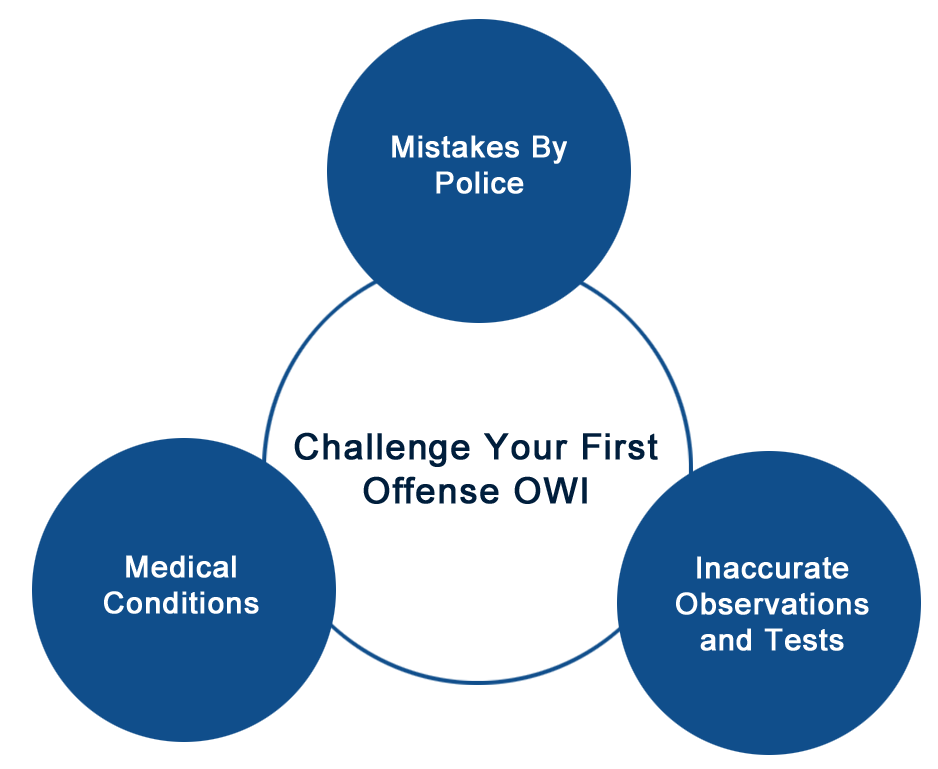 Inaccurate Observations and Tests
Inaccurate Observations and Tests
Subjective assessments rely on personal opinions and interpretations, while objective assessments are based on measurable, factual data. In OWI cases, police often make subjective judgments, like noting red eyes or unsteady walking, which don’t always indicate impairment and can be affected by other factors such as fatigue, medical conditions, or environmental elements. This subjectivity can lead to mistakes, making it crucial to challenge these observations in court using objective evidence, like properly administered tests. Police observations can be unreliable due to factors like poor lighting or weather, and breath tests may produce inaccurate results if not calibrated correctly or if the person has certain medical conditions. Field sobriety tests can be flawed by physical limitations or external conditions, and even blood tests, while more reliable, can yield incorrect results if mishandled or improperly tested.
Medical Conditions
Medical conditions can significantly influence the outcome of a first-offense OWI, potentially affecting the accuracy of breath tests, field sobriety tests, and blood tests. Conditions such as acid reflux, GERD, or diabetes can result in false positives on breathalyzer tests by producing compounds that resemble alcohol in the breath. Similarly, balance issues, neurological disorders, or anxiety can cause poor performance on field sobriety tests, even when a person is not impaired, leading to unfair conclusions about their level of intoxication.
In addition to these, there are hundreds of other potential defenses that can be employed to challenge and overcome first offense OWI charges against you.
Fight Your OWI with Experienced Counsel on Your Side
At Tracey Wood & Associates, our attorneys know Wisconsin’s OWI laws inside and out—and it shows. Our firm has helped a number of clients successfully fight both their administrative and drunk driving court charges in an effort to avoid the consequences associated with a first OWI offense.
Fighting an OWI is possible, but you need to act swiftly. To get started, please complete our online form now to schedule a no-obligation case evaluation.
Featured in The Media




Call 1-888-597-3622 or Schedule a Free Case Evaluation Online


